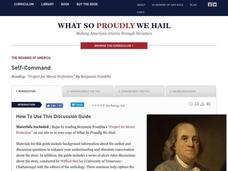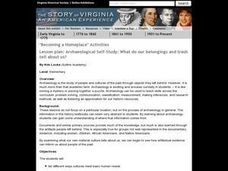EngageNY
Mid-Unit 2 Assessment: Inferring About the Silversmith Trade in Colonial Times
The seventh lesson plan in this unit on colonial trade assesses fourth graders' ability to use details from an informational text to make inferences and create a piece of informative writing. The included assessment begins with learners...
EngageNY
Taking Notes Using a Graphic Organizer: Inferring About Work and Play in Colonial America
What was life like in colonial America? Follow this lesson and your pupils will find out what people in colonial times did for work and for fun. Ask learners to compare and contrast the two texts and explain what the reading helped them...
EngageNY
End of Unit 1 Assessment: Inferring and Synthesizing (From Two Texts) About Life in Colonial America
Close your colonial America unit with a performance-based assessment. Class members will show their proficiency in several skills including using details to back up inferences, determining the meaning of words in context,...
EngageNY
Taking Notes Using a Graphic Organizer: Inferring About the Importance of Religion in Colonial America
Improve class understanding of colonial times by reading an informational text and filling out the accompanying graphic organizer. Class members work with a partner to read, take notes, make inferences, and synthesize information.The...
Curated OER
Inference
Making inferences about what you read is an important skill for both elementary, middle, and high school learners. Focusing on events which occurred during World War II, they answer a series of questions related to what we can infer as...
Curated OER
What Can We Learn From the Past?
What would future archeologists learn from your scholars' personal belongings? Have them bring in a box of "primary sources" from their home. Discuss the difference between observations and inference, using some of your own items to...
Curated OER
Teaching Inference with Trash and Mystery Objects
Students practice solving mysteries and using inference skills by digging through trash. In this problem solving lesson, students investigate groups of garbage to determine what type of person the garbage belonged to....
What So Proudly We Hail
The Meaning of America: Self-Command
Even for one of the most accomplished men in American history, there was room for improvement. Challenge high schoolers to use Benjamin Franklin's Project for Moral Perfection to analyze text, make inferences, connect to historical...
Curated OER
Call It a Hunch
Give young scholars a chance to practice making inferences after reading the book Through My Eyes by Ruby Bridges. They confirm whether or not their conclusions are true, have a class discussion, and then independently complete an...
Curated OER
Lessons in Looking: Contraband in Paintings
Using the paintings On to Liberty and A Ride for Liberty, 10th graders analyze historical perspectives on life after the Civil War. They attempt to determine what the Civil War meant for free slaves, then read a paragraph highlighting...
Curated OER
The Science of Thinking
How is fixing a flat tire like reading and writing? By thinking about each activity properly - identifying the problem and purpose, gathering information, and making inferences - you can exercise your thinking skills equally. This...
Curated OER
Archeology Lesson; Making Inferences
Students discover what an archeologist is and make inferences about societies and cultures based on artifacts. In this archeology lesson, students complete an array of captivating activities, guessing about what an artifact is...
EngageNY
Learning About Farms in Colonial America: Explicit vs. Inferred Information
Aid your pupils in understanding the terms explicit and inferred while teaching them about colonial farmers. The third activity in the module builds off the previous activity and focuses heavily on inference. Learners analyze a...
National Park Service
A Tale of Two Men
Theodore Roosevelt and the Marquis de Mores were both born in 1858, and both came to the Dakota territory in 1883, but they influenced the developing country of America in different ways. Elementary and middle schoolers apply written and...
Curated OER
Inference By Analogy
Students infer the use or meaning of items recovered from a North Carolina Native American site based on 17th-century European settlers' accounts and illustration.
Pocumtuck Valley Memorial Association
A Research Project: A Discussion of the Recreating and Populating of a Colonial Village
Primary source research, secondary source readings, and discussion provide the understanding necessary for students to create a colonial persona, and simulate a situation appropriate for this person, time, and place. While the lesson...
EngageNY
Reading and Taking Notes on Colonial Trades
In the tenth instructional activity of this unit, young scholars learn to categorize information as they continue researching their colonial trade. During guided practice, the teacher models how to read informational text slowly while...
EngageNY
Listening Closely and Taking Notes: Colonial Trade Podcast About the Wheelwright
Voices from the past. Young scholars listen to a podcast interview with a historical re-enactor as they continue their research in the eleventh instructional activity of this unit on colonial trade. Applying their close reading skills,...
Curated OER
Archaeological Study
Students analyze the difference between archaeology and anthropology while studying the evolution of different products. In this archaeology and anthropology lesson, students trace the progression of a certain tool or product and come up...
Federal Reserve Bank
Arts and Economics Infographic Questionnaire
How do careers in the arts contribute to America's gross domestic product? Use an informative infographic that details the economic details of careers in the core arts, including design services, performing arts, and arts education, to...
Curated OER
Kumeyaay Indians
Useful for literary analysis, citing textual evidence, or summary skills, this activity about the Kumeyaay Indians would be a good addition to your language arts class. Middle schoolers read novels and summarize the literature in their...
National Geographic
Australia, Antarctica, and Oceana
Go on a traveling adventure throughout Australia, Oceana, and Antarctica! This textbook excerpt offers a full unit of study that can easily be supplemented by extra projects or research materials. Learners study maps, read about...
C3 Teachers
2020 Protests: Is There Anything New about the 2020 Protests?
Are marches and protests an effective form of resistance? That is the question high schoolers seek to answer in this inquiry lesson as they compare the 2020 protests to historical ones. Researchers use Venn Diagrams to compare images...
Curated OER
Archaeological Self-Study: What Do Our Belongings and Trash Tell About Us?
Students examine how their belongings and their trash represents who they are. In this archaeology skills lesson, students watch a video titled "Discovering the Past" and then give archaeological techniques a try. Students examine and...
Other popular searches
- Teaching Inference Skills
- Inference Skills First Grade
- Reading Inference Skills
- Powerpoint Inference Skills
- Inference Skills in Reading
- Inference Skills Worksheet
- Science Inference Skills
- Inference Skills Sixth Grade























